#coldhands
Text

Just ahead, the elk wove between the snowdrifts with his head down, his huge rack of antlers crusted with ice. The ranger sat astride his broad back, grim and silent. Coldhands was the name that the fat boy Sam had given him, for though the ranger's face was pale, his hands were black and hard as iron, and cold as iron too. The rest of him was wrapped in layers of wool and boiled leather and ringmail, his features shadowed by his hooded cloak and a black woolen scarf about the lower half of his face. -- Bran I, ADWD
A Song of Ice and Fire Calendar 2024 || Coldhands by Justin Sweet
191 notes
·
View notes
Text
I’ve never come up with an entirely perfect working theory on Coldhands, but the one I lean toward most is that Coldhands is - somehow - an “ordinary” wight (to the extent the word can be used) whom Bloodraven has skinchanged into, effectively taking over from the Others' control of him, and is using as his agent, so to speak, outside the cave of the children of the forest. Whether or not this sort of skinchanging is even possible, I have no idea - but I gravitate toward this idea because I could see Bloodraven using, and justifying the use of, such a being to achieve his ends. As a wight, Coldhands would presumably raise no suspicions among other wights, and perhaps not the Others either - a useful cover for one who had to travel across many hostile miles between the Wall and the cave (and indeed, when Coldhands shows up to save Sam and Gilly, there doesn't seem to be any indication that the wights are going to attack him). Supernatural agents serving as his spies or as part of his spy network is of course nothing new for Bloodraven, given his actions in his political life: even if the stories Dunk remembers that Bloodraven “could change his face, put on the likeness of a one-eyed dog, even turn into a mist” and command “gaunt gray wolves [to hunt] down his foes” and “carrion crows [to spy] for him and [whisper] secrets in his ear” were not all completely true (though some, I think, undoubtedly were), Bloodraven was certainly willing to use a glamour to disguise himself as a hedge knight at the tourney at Whitewalls. From fabricating an identity, and face, to garb himself as another person, Bloodraven has, perhaps, progressed to taking over another person (or at least, their body) entirely, projecting himself into the world as he no longer physically can.
More to the point, I like the way that Coldhands as a skinchanged wight controlled by Bloodraven might in a way represent Bloodraven himself (beyond merely serving as his agent). Like Bloodraven, Coldhands is a Night’s Watch ranger, both complete with tattered old blacks that once reflected their Night's Watch membership, seemingly dead “long ago” but in fact alive (or as much as either can be deemed alive, anyway). Coldhands is, like Bloodraven, a figure both sustained and bound by supernatural power. As Bloodraven has “lived beyond his mortal span” thanks to the weirwoods’ magic, so Coldhands, though killed long before his encounters with Sam and Bran, walks and talks like a living being; however, just as Brynden is fated sooner rather than later to “[go] into the trees” completely, to remain permanently in the cave and join that lineage of greenseers on their weirwood seats, so Coldhands is restricted to the wilds beyond the Wall, permitted neither to cross the Wall’s boundaries nor to enter the children’s warded cave. Coldhands no more hesitates to serve Bran, the Reeds, and Hodor the physical flesh of Night’s Watch deserters, despite the horror of cannibalism, than Bloodraven hesitated to serve Daeron II and Aegon V, metaphorically, the flesh of Daemon Blackfyre and his sons and Aenys Blackfyre, respectively, despite the proscriptions against kinslaying and violating guest right (albeit perhaps with some personal qualms for Bloodraven to the former). In the sort of amusing twist Bloodraven himself might appreciate, the man who once spoke with the king’s voice as Hand now perhaps almost literally has another speak with his voice while he himself sits on a mystical throne. Too, as Bloodraven had once appeared to Dunk looking like “a living corpse” as the former rode through King’s Landing, so now a real living corpse, just as pale, would represent Bloodraven as he rode across the lands beyond the Wall.
What I like about this idea as well is the way in which it adds to the nuance and ethical questions surrounding Bloodraven and the magic he uses. To be clear, I think Bloodraven does care about saving the world: the literally superhuman effort put in to shepherding Bran to becoming his greenseer successor is I believe indicative of this aim. Nevertheless, by skinchanging into a raised wight, Bloodraven may be approaching something close to the rather more nefarious magic employed by the Others; if the very evil of the Others is in their enslaving the reanimated dead for the purposes of destruction, how moral or immoral is Bloodraven’s similar use of a wight, albeit for ultimately positive (or intended to be positive) ends? This potential willingness to take over a human body through magical means, with all the accompanying implications for and discussions on the morality of the actor in question, echoes not only in Varamyr’s disturbing Prologue (with his attempts to seize Thistle) but even in the otherwise very sympathetic Bran and his forcible takeover of Hodor, especially in non-survival or unintentional situations. Obviously, I do not think Bran is malicious or evil, much less on the level of monstrous Varamyr, but I do think the author wants readers to recognize the horror implicit here - through the Others, through these circumstances with Bran, and through, perhaps, Bloodraven’s control of Coldhands (hence the chilling self-identification of Coldhands as “your monster, Brandon Stark).
52 notes
·
View notes
Note
Is the requests thing still going??? Can I have some Coldhands Cuddles?? It’s been a long week I really wanna see my babies enjoying some domestic bliss under a fluffy and warm blanket. Both Wen Ning and Zhuzhi Lang have earned it.
It’s cool tho if requests are over though don’t feel obligated or anything!!!!
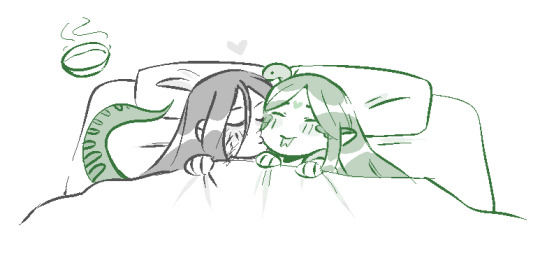
#they are technically closed but i got few so i'm happy doodling a few more!! hope you like it!#wen ning#zhuzhi-lang#coldhands#mdzs#svsss#binary pen tool 5 min reqs
90 notes
·
View notes
Text
i like that pre-hotd ‘coldhands is daemon targaryen’ was a ridiculous laughable theory bc daemon was a lore-only character only real nerds had ever heard of+it’d be an absurd reveal and post-hotd ‘coldhands is daemon targaryen’ is still a laughable ridiculous theory because could you fucking imagine
77 notes
·
View notes
Text
Coldhands.

#drawing#a song of ice and fire#asoiaf#daenerys targaryen#fanart#game of thrones#illustration#jon snow#sansa stark#the winds of winter#beyond the wall#the wall#the north remembers#coldhands
114 notes
·
View notes
Note
Ficlet request: Coldhands!!
Perhaps a holiday, if you want more direction. But any ficlet is good!
i'm so sorry i literally wrote this a month ago and simply forgot to post it! anyway this is like…holiday adjacent? mainly bc i think zhuzhi-lang's b-day should be a holiday. oh and this is canon to the rest of the series hehe <3
“My birthday?” Zhuzhi-lang glances up from Tianlang-jun’s latest attempt at storytelling—a poetic epic that mainly focuses on dual cultivation between those of the same sex—to give Wen Ning a curious look. “I don’t know when it is.”
“Oh…” Wen Ning’s expression doesn’t shift, hindered by the stiffness of his dead skin, but Zhuzhi-lang has gotten used to reading the slight changes. There’s an unmistakable tinge of dismay.
Wen Ning’s own birthday recently passed and even though he no longer ages physically, there were no small amount of well wishes sent his way. Zhuzhi-lang had spent quite a bit of time procuring a gift for him too. The fine set of deep black robes, embroidered with a delicate golden pattern along the edges, seem to have been received well. Wen Ning is currently worrying at the trailing sleeves of that very gift, after all.
“Is A-Ning asking because he wants to celebrate it?”
“Yes!” Wen Ning blurts. “But if you, well if you…” His hoarse voice trails off. “If you don’t remember when…”
“I remember,” Zhuzhi-lang lies. Warmth spreads throughout his chest. How pleasant it is, to have someone who cares enough to celebrate a day he doesn’t even recall.
What’s the harm in indulging such a person?
Wen Ning perks up. “You…you do?”
“Of course. It’s just been so long since I’ve celebrated that I momentarily forgot. Do forgive me.”
It isn’t difficult to come up with a date. His first thought is the day that Tianlang-jun gifted him a man’s form but, shamefully, he had been too preoccupied with his new body to take note of the date. But he remembers exactly when Tianlang-jun gave him a name.
Yes, that date should do nicely.
He tells Wen Ning.
“It’s soon,” Wen Ning says, surprised. His unblinking eyes are trained on a spot near Zhuzhi-lang’s shoulder as he processes the information.
Zhuzhi-lang quietly organizes the disordered pages splayed on the low table before him. It can take time for Wen Ning’s thoughts to escape through his mouth, and Zhuzhi-lang does not like to make him feel watched during such moments.
“You said,” Wen Ning begins slowly, “that it has been a while since the last time you celebrated your birthday?”
“Yes. Many years.”
“Do you not…enjoy it?”
Zhuzhi-lang tilts his head. “Maybe I don’t.” He reaches up to tug on Wen Ning’s sleeve, smiling when a cold hand catches his fingers before he can pull away. “Perhaps A-Ning will manage to change my mind.”
#thanks for the request! it was fun!!#zhuzhi lang#wen ning#ningzhi#coldhands#wen ning x zhuzhi lang#wen ning/zhuzhi lang#svsss#mo dao zu shi#my writing#my fic#crossover fic#livingmeatloaf
40 notes
·
View notes
Text
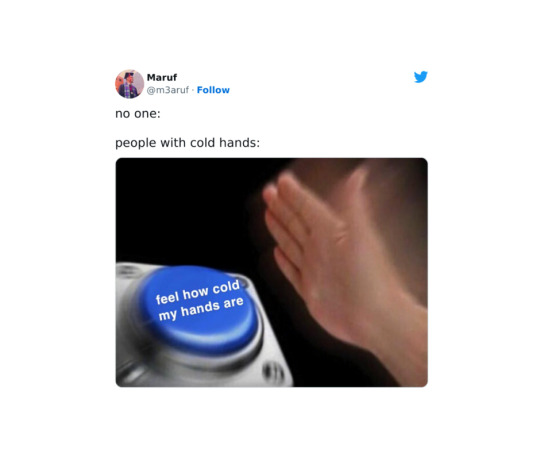
Guilty.
#relatablememes#coldhands#noonememes#winter#itscold#tumblr memes#tumblr meme#memes#meme#dankest memes#memecage#dank memes#funny memes#funny meme#funny#wholesome memes#relatable memes#humor#funny post#jokes#fresh memes#lolmemes#lol#positive memes#funny photos#funny pictures#funny stuff#funny image#this is so funny#too funny
274 notes
·
View notes
Text
Revisiting the Rat Cook, part 3: "Just Eat"
The third part of my ongoing series in which I examine how the themes and symbols present in the "Rat Cook" story, as relayed in ASOS Bran IV, and how those elements reappear throughout ASOAIF.
Part one is here and part two is here, but hopefully these also stand alone as well.
To anyone who is reading this part first, "Revisiting the Rat Cook" is a series that is built on the understanding that GRRM's use of metadiegetic legends provide a "road map" of symbols and meaning, used in their abstract form, which we, as readers, can use to better understand the relationships between symbols, motifs, and themes as they reoccur throughout ASOAIF as a whole. The Rat Cook story is about a rat which eats rats, or a cook who serves kings; The Rat Cook story is about fathers and sons, about cannibalism, about trust, about vengeance, and about damning one's legacy.
"Just Eat"
Last post, I talked about various moments where the flesh of men and the flesh of pigs were compared: times where dead pigs evoked dead sons, where dead sons evoked dead pigs, and where human victims would "become" pork in death. Finally, at the end, I talked about what some part of that transformation said about guest right in particular, a key part of the "Rat Cook" story. I pointed out how guest right is a social construct, necessary to maintain peace in a community, where those feeding and those being fed can both trust that they will come to no harm.
In this part of the series, I'm going to reach a similar conclusion about guest right, approached from a different angle. This part is about the relationship between "hosts" and "guests", and what it means when a character is being forced into the role of the "Andal King" from the Rat Cook story, who was unwittingly fed his own son. What does it mean, in ASOIAF, when a character cannot trust the provenance of their food, especially in the most extreme case: being fed human flesh.
Recognizing the dynamics between the Rat Cook and the Andal King, the inherent trust between those who feed and those who are fed, the host and the guest, and the power dynamics between a liege and a lowly cook, we see that the fear of the unwilling cannibal in the Rat Cook story is also a fear of the betrayal of those dynamics.
The fear of being turned cannibal unwillingly is referenced in AFFC Arya II, when Arya is being hosted—and fed—-by the House of Black and White, and when, after preparing dead bodies, she suddenly considers the similarity between eating human flesh and eating pork:
Once, as she was eating her supper, a terrible suspicion seized hold of her, and she put down her knife and stared suspiciously at a slice of pale white meat. The kindly man saw the horror on her face. "It is pork, child," he told her, "only pork”
This interaction is mirrored with another reassurance that meat is only pork, when Coldhands offers Bran and his party a “sow” in ADWD Bran I. Bran does not make the connection with cannibalism explicit, nor does anyone else present, but the reality of the meat’s provenance is far more clearly suspect:
Meera Reed was turning a chunk of raw red flesh above the flames, letting it char and spit. "Just in time," she said. Bran rubbed his eyes with the heel of his hand and wriggled backwards against the wall to sit. "You almost slept through supper. The ranger found a sow."
This scene is particularly haunting, perhaps because this is a rare instance of actual cannibalism, rather than imagined cannibalism. Martin creates this moment's unsettling atmosphere by highlighting each of party in turn, using gruesome language to describe them eating:
Behind her, Hodor was tearing eagerly at a chunk of hot charred flesh as blood and grease ran down into his beard. Wisps of smoke rose from between his fingers. "Hodor," he muttered between bites, "hodor, hodor." His sword lay on the earthen floor beside him. Jojen Reed nipped at his own joint with small bites, chewing each chunk of meat a dozen times before swallowing.
The ranger killed a pig.
In this instance, the meat is notably never directly called pork—it is “chunks of meat”, it is “hot charred flesh” still running with “blood”, which evokes Victarion’s hot pork-crackling arm as well.
Bran’s internal affirmation that “the ranger killed a pig” is given its own sentence and its own paragraph—it’s a connected idea, but it’s not what’s happening. Still, a man—once butchered—may become a “sow” in the same way that the Rat Cook, too, became as “big as a sow”, just as we saw with the butchered butcher’s boy, Micah.
Bran, for his part, nearly puts the ideas together. Without eating, he drills Coldhands as to what happened to the men chasing them, whose disappearance comes simultaneous to the appearance of the “sow”.
"What happened to the men? The foes behind us?"
"They will not trouble you."
"Who were they? Wildlings?"
Meera turned the meat to cook the other side. Hodor was chewing and swallowing, muttering happily under his breath. Only Jojen seemed aware of what was happening as Coldhands turned his head to stare at Bran. "They were foes."
Men of the Night's Watch. "You killed them. You and the ravens. Their faces were all torn, and their eyes were gone." Coldhands did not deny it. "They were your brothers. I saw. The wolves had ripped their clothes up, but I could still tell. Their cloaks were black. Like your hands."
In the midst of the questions about the men, our attention is again drawn each of the party eating in turn, further strengthening the connection between a slain man and a slain sow. These were men of the Night’s Watch, as was Coldhands, we presume, so they are Coldhands’ “brothers”, and so again this is the slaying and serving of family. And again, for the rest of the party, already eating when Bran wakes, it is unwilling, unknowing cannibalism. Coldhands, like the Rat Cook, has offered a meal and called it pork; mimicking the Andal king, the recipients don’t question its origin—for, at this point, they trust the "host" they are with—and instead, they find it delicious, just as Sam feared he would while Bannen burned. After all, turning cannibal is one thing, but as shown in the passage from the last post with Sam and Bannen, it is a sickening thought to come up with on one’s own. To be an unknowing cannibal, though, is always possible, but only so long as there is a stark betrayal of trust.
This scene with Coldhands, especially if we suspect that Coldhands is feeding Bran's friends the flesh of men, is a harsh reminder of that same essential idea from the Rat Cook story: that the sharing of food is always an exchange of trust in its very nature. As I've said before, the notion of “guest right” reflects that—you must trust the person feeding you to eat the food they serve you, and you’ll only feed those whom you trust and want to welcome. The Rat Cook story, of course, is the pinnacle of betraying that trust, and the cook himself is punished for exactly that; the Andal King, for his part, believed he could accept what he was served, which is how the Rat Cook was able to enact his vengeance.
We are also reminded of this relationship between shared food and trust when Quentyn is in Meereen, talking to the Tattered Prince. This exchange notably uses pie as a metaphor, too, doubly prompting the reader to recall the Rat Cook story here.
In ADWD The Dragontamer, Quentyn is faced with a life-or-death moment of trust over the Brazen Beasts’ code word. Quentyn doubts the veratity of this information, wondering whether the Tattered Prince really knows the code words... and he receives this in response:
“But a prince should know better than to pose such questions, Dornish. In Pentos, we have a saying. Never ask the baker what went into the pie. Just eat.”
As Quentyn points out himself:
“There was wisdom in that.”
In this moment, we may be given an insight into the mind of the “Andal king” (even if Quentyn is only a Rhoynar Prince). If this is the Pentoshi version of “don’t look a gift horse in the mouth”, then its phrasing is curiously resonant with the Rat Cook story, with pies of unknown provenance. Quentyn is reminded here of the importance of the unspoken rules of trust between allies; the trust is mutual, and he must trust the Tattered Prince if he is to be trusted himself. Similarly, just as the Rat Cook should have been bound by the laws of hospitality, the Andal King was bound by those same laws of trust, and didn’t question what was happening. Did the Andal King ever learn the fate of his son? We don’t hear that side in the version that Old Nan tells Bran.
As for Quentyn, it’s worth noting that this trust turned out to be ill-fated.
Seemingly, the code word did not help, and perhaps Quentyn’s skepticism was worthwhile. Of course, even that isn't the full story—it’s possible that the Tattered Prince was being true, and the plan was only ruined by the machinations of the Shavepate and some rat-masked Brazen Beasts. (I may return to this idea in a later part, but only if I feel confident enough to tackle Dany and Meereen, which really is quite a knot.)
If this scene with the Tattered Prince provides an in-world reminder of how the exchange of food provides a metaphor for the dynamics of a given scene, then when the stakes are possible cannibalism, then the stakes of that metaphorical comparison are heightened as well. Unwilling cannibalism is, in a way, the pinnacle example of betraying that host-guest trust.
It makes us reconsider our scene with Arya:
Once, as she was eating her supper, a terrible suspicion seized hold of her, and she put down her knife and stared suspiciously at a slice of pale white meat. The kindly man saw the horror on her face. "It is pork, child," he told her, "only pork”
Arya questioning the origin of the meat in the House of Black and White is just as equally a valid question to ask about her entire wellbeing in that setting—she has no true reason to trust that the House of Black and White wants the best for her, nor that she is safe in their care. This concern is a concept allegorically played out in the serving of the food. Metaphorically, she has doubts as to whether she can trust what the Faceless Men are “feeding” her—are they feeding her lies, or the truth? Are they feeding her pork, or dead men?
The Kindly Man is reassuring, as he always is, but all he can offer is reassurance—like Arya questioning the food she is being served, this moment suggests that she ought to be questioning the hospitality she is receiving in the House of Black and White in its entirety.
Returning to the scene with Bran and Coldhands, we can apply the same thinking, and that context illuminates the direction the conversation takes. First, it is about the meat that Coldhands has served them. Then, it is about the men who Coldhands has killed, whether they were allies or foes, and whether they were brothers. This pairing of ideas links serving the suspicious meat of the alleged “sow” with the question of whether to trust Coldhands; Bran considers the Night’s Watch his allies, and is rightfully suspicious of those who would kill Night’s Watchmen, not knowing that these particular Night’s Watchmen were foes. Finally, though, the conversation turns to Coldhands himself, continuing where we left off in ADWD Bran I:
“Coldhands said nothing.
‘Who are you? Why are your hands black?’”
This, immediately after the prior discussions, continues to link these major ideas of the Rat Cook story—the slaying of family, the unwilling cannibalism, and the trust that is necessary to end up in such a terrible fate. Bran’s party is blindly trusting Coldhands to take them somewhere, as they trust him to feed them pork, not human flesh; as they continue to follow him north, Bran’s party metaphorically does not know what they are being “fed”, in a sense—is it the destination they believe, or is it something else? Further confirming this thought process, linking the unknown meat with the unknown journey, the questions continue to the logical conclusion:
"Show us your face."
The ranger made no move to obey.
"He's dead." Bran could taste the bile in his throat. “Meera, he's some dead thing. The monsters cannot pass so long as the Wall stands and the men of the Night's Watch stay true, that's what Old Nan used to say. He came to meet us at the Wall, but he could not pass. He sent Sam instead, with that wildling girl."
Meera's gloved hand tightened around the shaft of her frog spear. "Who sent you? Who is this three-eyed crow?"
Bran is faced with the same fears that strike Arya in the House of Black and White:
If they cannot trust what they are being fed, can they trust where they are being led?
The notion of finding a sow in the tundra may be as likely as finding a benevolent wizard in the wastes of the far north, but that is what Bran still believes even at this moment.
Coldhands feeding them human meat under false pretenses, and his refusal to be honest or direct about the source of the meat, therefore marks a betrayal of that trust—and possibly portends a betrayal of the other trust as well. The question of their journey’s end, and whether they are being told the full story about their destination, naturally follows the question of whether they are being fed false “pork”.
Did the Andal King have similar misgivings that he similarly ignored, believing instead in the social covenant of guest right that he had entered into? If the Andal king had denied the pork pie, would he have been in the right for his skepticism, or in the wrong, as the Tattered Prince says, for “asking the baker what went into the pie”? Is it, as Quentyn says, wiser to trust? The Rat Cook story that Bran recalls moves on from this question without answering it. We never learn if the Andal King ever learned the truth. "The Rat Cook" instead goes on to focus on the aftermath of the incident, and the fate of the cook, whose punishment, again, was not for forcing cannibalism but for betraying the trust of guest right.
In the next few parts, I'm going to stray away from eating men for a while and focus on eating rats—what I think rats symbolize in ASOIAF, espcially when paired with the action of eating. After all, it's in the story's title: the "Rat Cook", and "rats" are as key a symbol as cannibalism, pork, and pies. Later, though, I'll be returning to this issue of trusting in a social contract, like guest right, so it's good to keep this idea in mind, as well as the power dynamics inherent in eating and being fed, when considering what it means to eat rats, too.
#a song of ice and fire#asoiaf#rat cook#asoiaf analysis#asoiaf meta#arya stark#bran stark#coldhands#quentyn martell#RtRC
19 notes
·
View notes
Text
Why is every Benjen Stark fic prompt so fucking sad, man. I'm scrolling down the few fics that there are and it goes from sad to sadder.
"Benjen fic where he's the last living person in his family"
"Benjen fic where he joins the nights watch after his family dies, because of the horrible guilt that will forever corrode him from all the secrets that he had no choice but to keep"
"Benjen fic where he is alone in winterfell watching every single person that he loves die because he's hopeless and can't do anything to prevent it"
Might as well write a fic where he's just had it and he kills himself. Go ahead!! Make him suffer and kill the man!! Unless you already had a fic of him getting stabbed by a white walker, becoming a non-human sort of creature that even after death carries the guilt of the secrets that he had to keep and the horrors of knowing that all his family is dead-
...
Being a benjen stark fan is like living as sisyphus, stuck in an endless loop of reliving the same atrocities. The difference is that once we, Ben's fans, have gone through the battle, we go back to it willingly because we hate ourselves but we love this (seemingly sad) fictional man.
#benjen stark#rant#house stark#game of thrones#got#a song of ice and fire#asoiaf#night's watch#benjen stark fic#benjen stark imagine#george rr martin#robert's rebellion#lyanna stark#ned stark#brandon stark#coldhands#valyrianscrolls
31 notes
·
View notes
Photo


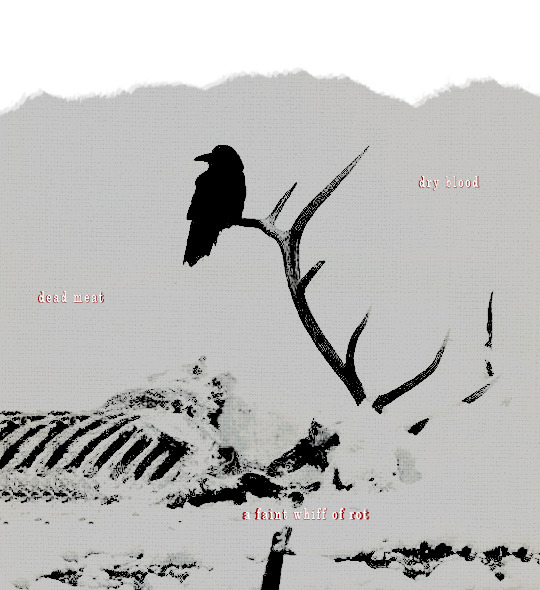
"The ranger..."
"He cannot come."
"They'll kill him."
"No. They killed him long ago."
165 notes
·
View notes
Text



He does not eat, he never drinks, he does not seem to feel the cold.
#coldhands#benjen stark#thenorthedit#asoiafedit#housestarkedit#valyriansource#gotasoiafsource#direwolfdaily#valyrianscrolls#house stark#*gifs#ours#asoiaf#a song of ice and fire
213 notes
·
View notes
Note
What's your opinion of Coldhands and Benken Stark? GRRM said he's not Benjen - and he also said in the books we would see much more of the north beyond the wall, so we may have him as the guide? And Leaf said CH died "a long time ago", so for a three hundred years, we may be talking about centuries long.
There's a theory that says he's the Last Hero. And it would be a plausible theory about the sacrifice he had to do to save the world. He somehow do it for the sake of everyone else.
Maybe Benjen met him. Maybe CH saved Benjen and he learned what was happening beyond the wall (or they met before and Benjen didn't know how to explain children fables to his brother, so he went to explore and grab some proof). There's a lot of mystery there and I don't see it very explored except in very few metas.
Hi there! (And sorry for the delay.)
I don't really dabble too much in the older histories of the series (like the many versions of the Last Hero) but I sincerely doubt that Coldhands is going to have that level of prominence, mainly because I don't think that GRRM is working the themes of sacrifice and "problem solving" in this way. Sacrifice is often portrayed as exploitative, and individual "heroes" are cut down by the narrative as unsuccessful, reckless, or deeply morally ambiguous. We are not going to be presented with a solution to any problem that specifically eschews large-scale cooperation and complex compromises in favor of one individual having to make an unspecified "sacrifice". (Especially since that "sacrifice" obviously did not lead to an actual permanent solution since the ice threat is well on the rise again, and they needed to build a giant Wall and found the Watch anyway.)
Coldhands and Benjen having met would certainly be possible and even plausible. We know that someone buried those dragonglass weapons near the Fist of the First Men fairly recently, wrapped in a good quality unrotted Nights Watch cloak. If there is a flexible "agent" working to influence individuals beyond the Wall on behalf of someone connected to the weirwood cave and the weirwood network (be that the children, Bloodraven or a later iteration of Bran manipulating events through time), Coldhands is certainly the ideal candidate.
I think Coldhand's existence as a sentient wight is far more interesting and relevant than his original identity, though. He is in opposition to the non-sentient wights but in essence the same thing. He's a symptom of someone else's conflict, more than an active player. If he was a Bloodraven loyalist who came to the Wall with him, it would explain his willingness to serve his cause even now.
What became of Benjen in this context we can't know. I suspect the buried cloak may have been his. I do doubt that Benjen would not have tried to communicate more effectively with Lord Commander Mormont on this, though, if he had gained this information. Never mind Ned. Mormont is clearly already concerned about everything but ignorant of the true nature of the threat, so why leave him in the dark for so long, even if it's just rumors? His fellow rangers were killed and marched back to the Wall. Whatever befell Benjen, it has also prevented him from acting in the interest of the Watch or the Realm. If he is still alive (or undead) he has been under someone else's control in some way. I suspect Bran may come into contact with him or give us a glimpse into what happened to him and what information Benjen can contribute regarding past events, since GRRM made sure to include him in Bran's tree vision of the past.
12 notes
·
View notes
Text

happy birthday @crimsonrainseekingflower!!!! it's been such a pleasure knowing you and being your friend and getting to read your wonderful fics 🥰
86 notes
·
View notes
Text
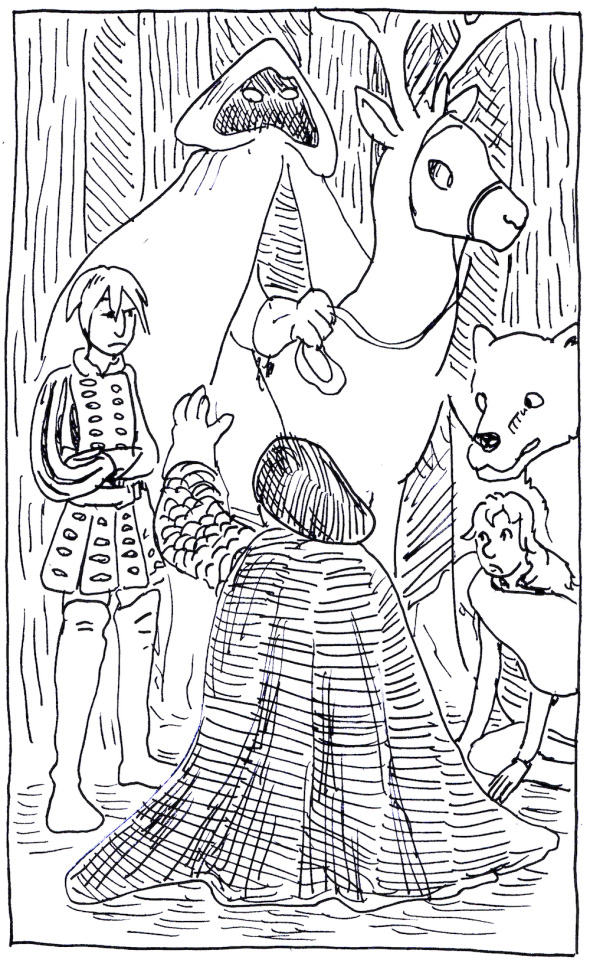
Three times he had sworn to keep the secret; once to Bran himself, once to that strange boy Jojen Reed, and last of all to Coldhands. "The world believes the boy is dead," his rescuer had said as they parted. "Let his bones lie undisturbed. We want no seekers coming after us. Swear it, Samwell of the Night's Watch. Swear it for the life you owe me."
Samwell Page 1047
Sam remembers his promise to Bran, Coldhands, and Jojen to keep the secret that Bran is alive.
I decided to do this one as a flashback. I'm not completely happy with the composition, and elk are just as hard to draw as horses, but the principle is sound.
In hindsight, I wonder what would make Sam fold quicker, the terrifying zombie or Jojen giving him the eye?
#asoiaf#a storm of swords#illustration#pen and ink#samwell tarly#jojen reed#bran stark#summer#coldhands
12 notes
·
View notes
Text
using the Coldhands’s Longsword is Dark Sister theory to support the Coldhands = Danny Flint theory, because danny was a girl who became a black brother of the watch, a dark sister
#when the two tinfoils connect nicely <3#in valyrian does dark sister translate synonymously with dark brother#asoiaf#coldhands#danny flint#dark sister
143 notes
·
View notes
Text
Coldhands, and the Great Elk

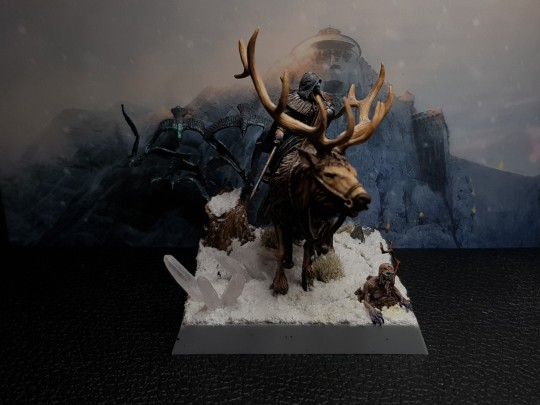
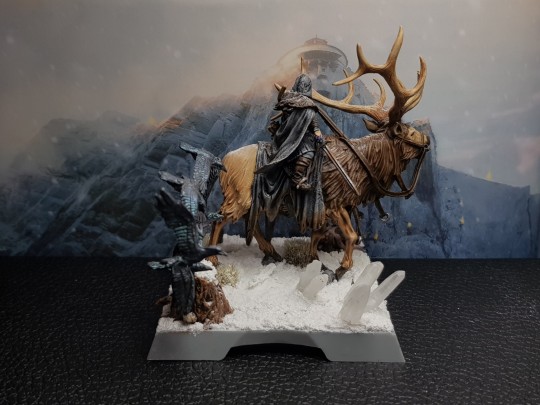
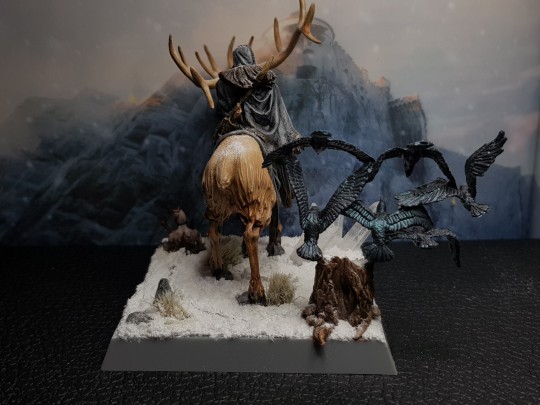



"[Coldhands] That wasn't his true name. We only called him that, Sam and me. His hands were cold as ice, but he saved us from the dead men, him and his ravens, and he brought us here on his elk."
Another Coldhands, this time with his trusty elk. As I said, Coldhands is a fantastic character, I love the image of him ranging the Wild like an inverted knight errant. I made this little mini diorama to capture that - the flock of ravens, and a new wight crawling out of the ground ready to be put back down.
I went back and forth on the elk colour scheme endlessly, it would have been very striking to do a dark brown/almost black elk to match Coldhands' scheme, but I couldn't shake this beautiful piece of artwork which goes for a lighter more naturalistic look. In the end I'm very happy, and it captures the mix between Nights Watch and wildness that Coldhands embodies.
#asoiaf#asoiaf fanart#miniatures#minis#a song of ice and fire#valyrian scrolls#cmon#the north#coldhands#Night's Watch
42 notes
·
View notes